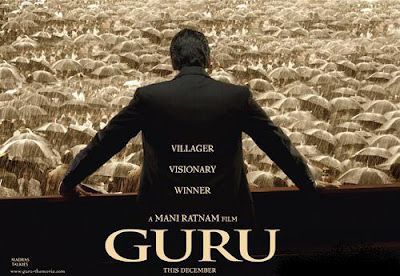 What a joy to catch the new Mani Ratnam film in the cinema, only tempered by the thought that this film -- from India's premier director -- didn't get reviewed in the UK press. Partly this was because the distributor probably didn't offer a press screening, but even so, you would expect the reviewers of the broadsheets to look out for Mani's films.
What a joy to catch the new Mani Ratnam film in the cinema, only tempered by the thought that this film -- from India's premier director -- didn't get reviewed in the UK press. Partly this was because the distributor probably didn't offer a press screening, but even so, you would expect the reviewers of the broadsheets to look out for Mani's films.It was enjoyable and it's an important film in terms of the story and the performances from Abhishek Bachchan and Aishwaria Rai, but I have to admit that as a Mani Ratnam film it's slightly disappointing lacking some of the sheer bravura of earlier films. I also thought the songs were less memorable. I've looked at several Indian reviews of the film and I'm with the bulk of them. Mani Ratnam often suffers from being too commercial for the cinephiles and too serious for the popular audience (some of yesterday afternoon's tiny audience left before the end). But this could be construed as demonstrating that it is the audience and the industry who need to catch up. I think that Mani may indeed be the Indian director who makes the film that finally breaks Hindi Cinema in American multiplexes (which would be ironic for a Tamil director).
The importance of the story lies in its approach to the history of Indian capitalism. It draws on the career of Dhirubhai Ambani, founder of Reliance Industries, and offers a picture of how business was conducted before the relatively recent 'liberalisation' of the Indian economy. There is a a discourse of social class running through the film with the central character Gurubhai Desai appealing as a 'villager from Gujerat' for the support of ordinary shareholders rather than the upper middle-class who previously controlled Indian business. My companion at the screening, who has worked in the international petrochemical business, commented that he didn't think such a story could have been told in India until the last few years. Whilst the film works well to expose the corruption and bribery that went on, it also works well as a melodrama of surrogate fathers and sons. There are, however, several plot holes in the melodrama and some characters seem to simply disappear.
There is a detailed entry on the film at Wikipedia and early signs are that it has done very well in India and in North America and Australia. In the UK it ranked 15th on a 44 screen opening with a screen average of over $7,000 (Screen International).
It would be good if someone released Mani Ratnam's earlier work on DVD in the UK. (I was intrigued to see that Time Magazine included Nayakan (1987) on a list of 'all-time' Top 100 films.

1 comment:
Awesome post . Couldnt agree with you more on the fact that ,everyone around expected a little bit more from Mani .
Personally Im surprised on your knowledge on a south Indian director ..
Cheers,
srkriz@gmail.com
PS : Havent you seen Nayakan yet ?
Post a Comment